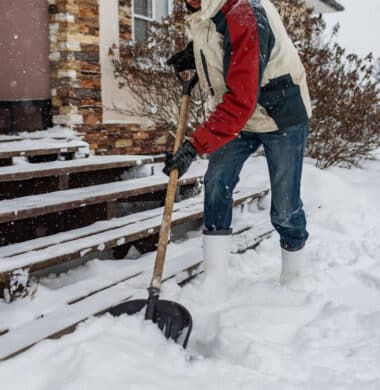Can I Shovel Snow with a Heart Condition?

Winters in the Denver area are typically very snowy, and shoveling snow off sidewalks and driveways is a regular part of life throughout the cold months and if you want to have a really nice driveway you should try the driveway gates services which are perfect for this. However, it’s important to understand the ways shoveling snow can impact your health, especially if you have a heart condition. There is considerable research indicating that shoveling heavy snow may increase your risk of a heart attack.
Shoveling snow may not seem like hard work, but it can put significant strain on your heart. This is especially true when the snow is wet and heavy, or when you are shoveling large quantities of snow after a major storm. Research has found that shoveling snow for just two minutes can elevate your heart rate to over 85% of your maximal heart rate. This level is commensurate with heart rates associated with intense aerobic exercise. Individuals who aren’t physically fit experience this increase in heart rate more intensely than people who are in good shape.
Another study found that the chance of a heart attack increases when shoveling after a heavy snowfall exceeding 7-8 inches. In this situation, men were 16% more likely of being admitted to the hospital with a heart attack and 34% more likely to die. This increase in risk wasn’t found in women.
How Does Shoveling Snow Impact Your Heart?
Intense physical activity places increased demands on your heart. Your heart rate increases in order to provide sufficient blood flow and deliver essential nutrients to the muscles undergoing exertion. In addition, the force of your heartbeat may increase to address the increased physical demands associated with your actions.
Depending on your age, overall health and level of physical fitness, intense strenuous exercise can push your heart to its maximum heart rate. When your heart rate remains at this level for extended periods of time, it can place significant stress on your heart. In addition, rigorous physical activity can cause a temporary spike in your blood pressure.
While intense exercise by healthy individuals can provide positive long-term benefits to your heart, the same level of exercise can present risks for people with heart conditions. For this reason, it’s critical to speak with your cardiologist to find out whether it’s safe to shovel snow with your heart condition.
Tips for Shoveling Snow with a Heart Condition

- Consult with your cardiologist – Before trying to shovel, always consult your cardiologist to make sure it’s safe to do so. If your heart doctor advises against shoveling, then you’ll need to find someone who can perform this task for you. Ask friends or family members to help with the shoveling and if necessary, hire a professional snow removal service.
- Dress appropriately – Anytime you’re exerting yourself in cold weather, it’s important to wear the appropriate layers to ensure you stay warm. Make sure to wear a warm, waterproof jacket to help you stay dry. You should also wear a hat, gloves and scarf to prevent heat loss. In addition, it’s a good idea to wear an underlayer that can be removed if you feel like you’re overheating while shoveling.
- Warm up – Whenever you’re engaging in strenuous exercise, it’s important to warm up before you begin. Do some light stretching and calisthenics to increase blood flow to your muscles and loosen your joints prior to shoveling.
- Use the proper shovel – Choosing the right shovel can help minimize the stress on your heart. Use a lightweight, ergonomic snow shovel containing a curved handle. This will help minimize bending and lifting, which will relieve some of the strain on your heart.
- Use the proper technique – Whenever possible, push the snow rather than lifting it. This will help minimize the strain on your heart.
- Stay hydrated – It’s always important to drink plenty of water while engaging in strenuous exercise. It’s common to lose more fluids through sweating than you realize when you’re exerting yourself in cold weather, so proper hydration is critical in these conditions to reduce the stress on your heart.
- Take regular breaks – Taking frequent breaks will give your body a chance to rest and reduce the risk of overexertion.
- Listen to your body – Always be on the lookout for warning signs that you may be experiencing a cardiac event. If you experience chest pain, shortness of breath, lightheadedness, or dizziness, stop shoveling right away and seek medical attention as a precaution.
South Denver Cardiology Can Help
At South Denver Cardiology Associates, we provide comprehensive clinical cardiology services to help you manage a wide range of heart conditions and maintain optimal heart health. We offer diagnostic testing to determine the specific heart condition you’re experiencing. This helps us recommend the right treatments and lifestyle adjustments to properly manage your condition. This may include recommending that someone else shovel snow for you to limit unnecessary stress on your heart.
In addition, our medical fitness gym is a great way to develop a customized fitness program that will help improve your heart health. You’ll work one-on-one with one of our certified exercise specialists who can help you understand the types of exercise that are safe for your heart condition, and which activities may not be advisable based on your current level of fitness and heart health. Over time, we’ll work with you to improve your fitness so that you can reduce the risk of triggering a cardiac event when engaging in strenuous activities.
Contact us today to schedule an appointment. South Denver Cardiology Associates serves patients in Denver, Littleton and the surrounding areas of Colorado.
- Lifestyle Factors That Increase Your Risk of Heart Disease - May 26, 2025
- 6 Tips for Exercising Outdoors with a Heart Condition - May 19, 2025
- Lifestyle Changes That Can Help Manage Arrhythmia - April 30, 2025
Sign Up
As with any health concerns, your specific treatment program should be discussed thoroughly with your primary care physician as well as any specialists who may need to be consulted – like a cardiologist.
Sign Up
